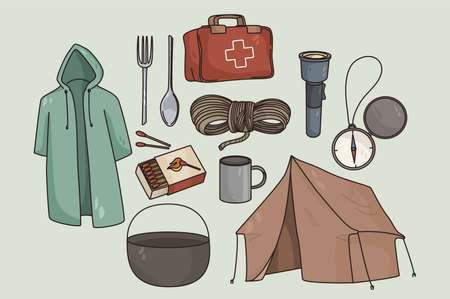Introduction to Low-Impact Camping in the UK
Low-impact camping is more than just a buzzword—it’s a conscious approach to enjoying the great British outdoors while preserving its beauty for future generations. In essence, low-impact camping involves minimising your environmental footprint by making thoughtful choices about where you camp, how you travel, and, crucially, the gear you use. For those of us exploring the diverse landscapes of the UK—from the rugged Highlands of Scotland to the rolling hills of the South Downs—this practice is especially significant.
Why does it matter here? The UK is home to some of Europe’s most treasured natural habitats, but with high population density and increasing numbers of outdoor enthusiasts, these spaces are under constant pressure. Overcrowding at popular sites, sensitive wildlife, and strict land access laws make it essential for campers to tread lightly. British campers face unique challenges: unpredictable weather, limited wild camping rights in England and Wales, and delicate ecosystems that can easily be damaged by careless behaviour.
However, these challenges also create opportunities. The UK’s strong tradition of countryside stewardship and community-led conservation means there are abundant resources for learning and collaboration. By making ethical gear choices—prioritising durability, repairability, local production, and sustainable materials—we can set a new standard for responsible adventure. In this guide, we’ll explore what it takes to camp low-impact in Britain, starting with the essentials: your kit.
2. Key Principles of Ethical Outdoor Gear Choices
When venturing into the UKs diverse landscapes, from the rugged peaks of Snowdonia to the rolling hills of the South Downs, it is crucial to make gear choices that reflect both environmental and ethical responsibility. Selecting low-impact camping gear goes beyond just reducing waste; its about supporting practices that protect local ecosystems, bolster British communities, and ensure fairness across supply chains. Below is a breakdown of core ethical considerations you should weigh when choosing your kit:
Sustainability
Prioritise products made from renewable or recycled materials. Consider durability over disposability—gear that lasts for years will ultimately have a lower footprint than single-use alternatives. Look for brands with recognised eco-certifications and transparent environmental policies.
Local Sourcing
Choosing locally-made gear helps reduce transport emissions and supports UK businesses. It also increases the likelihood that your equipment has been designed with British weather and terrain in mind, which can enhance safety and comfort on your trips.
| Consideration | Why it Matters in the UK | What to Look For |
|---|---|---|
| Sustainability | Protects unique British habitats like moorlands and woodlands | Recycled fabrics, minimal packaging, repair services |
| Local Sourcing | Reduces carbon footprint and stimulates regional economies | ‘Made in Britain’ labels, local stockists, regionally-adapted designs |
| Fair Labour | Upholds worker rights both at home and abroad | Ethical trade certifications, company transparency reports |
Fair Labour Practices
Ensure that manufacturers respect workers’ rights throughout their supply chains. This applies to UK-made products as well as imported goods. Ethical brands are usually transparent about their production processes and are willing to share information about how they safeguard fair wages and working conditions.
Avoiding Greenwashing
With many companies now marketing themselves as ‘eco-friendly’, it’s important to scrutinise claims carefully. Genuine ethical brands provide evidence—such as third-party certifications, detailed impact reports, or clear answers to direct questions.

3. Sustainable Tents, Sleeping Solutions, and Shelter Options
When it comes to low-impact camping in the UK, your choice of tent and sleeping gear is crucial. Many campers are now looking for equipment that minimises environmental harm without sacrificing comfort or resilience against classic British weather. Here’s a practical guide on choosing eco-friendly tents, sleeping bags, and mats—with a focus on brands and products you can easily find across the UK.
Tents: Eco-Conscious Choices
Start by seeking tents made from recycled or sustainably sourced materials. Look for certifications such as Global Recycled Standard (GRS) or bluesign® approval—these signal responsible manufacturing. Vango and Snugpak, two well-respected UK brands, offer lines made with recycled polyester and reduced-chemical processes. When assessing environmental impact, consider the tent’s durability (does it last multiple seasons?), repairability (are spare parts available locally?), and end-of-life options (can it be recycled or upcycled?). Avoid disposable festival tents; opt for quality models designed to withstand British rain and wind.
Sleeping Bags: Material Matters
Sustainable sleeping bags are increasingly available on the UK market. Rab and Alpkit both offer models using recycled synthetic insulation or responsibly sourced down certified by the Responsible Down Standard (RDS). Check for PFC-free water repellent coatings to reduce chemical pollution. Evaluate whether the bag provides adequate warmth for UK conditions—look at the EN/ISO temperature ratings—and if liners or stuff sacks are also produced with eco principles in mind.
Mats and Pads: Comfort with Conscience
For sleeping mats, prioritise closed-cell foam pads made from recycled materials, or inflatable mats designed for longevity and repairability. Therm-a-Rest offers self-inflating mats with partially recycled fabrics, which can be found at most outdoor retailers nationwide. Avoid single-use air beds or cheap foam that degrades quickly; instead, invest in quality mats that can be repaired rather than binned after a puncture.
How to Assess Environmental Impact
To make an informed decision, ask yourself: Where was this product made? What is its expected lifespan? Can it be maintained or repaired locally? Does the brand have transparent sustainability policies? Scrutinise packaging—minimal plastic is best—and favour companies who offset carbon emissions during production or shipping within the UK. By combining these considerations, you’ll find shelter solutions that align with both your ethical standards and the unpredictable nature of British camping.
4. Low-Impact Cooking and Eating Gear
When it comes to responsible camping in the UK, your choices of cooking and eating gear play a crucial role in reducing your environmental impact. From selecting reusable utensils to opting for stoves that minimise fuel consumption, each decision shapes your footprint on Britain’s wild spaces. Here’s a closer look at low-impact solutions that align with ethical camping values.
Reusable vs. Compostable: Choosing the Right Tools
Single-use plastic cutlery and crockery are now largely frowned upon across UK campsites and national parks. Instead, most outdoor enthusiasts favour reusable kits made from stainless steel, bamboo, or durable recycled plastics. If you prefer compostable options for short trips or festivals, look for those certified as home-compostable by UK standards (such as EN 13432). Below is a comparison of popular choices:
| Type | Material | Durability | Sustainability Notes |
|---|---|---|---|
| Reusable Cutlery Set | Bamboo/Stainless Steel | High | Bamboo is renewable; stainless steel lasts decades |
| Compostable Plates | CPLA/Plant-based fibre | Single Use | Choose certified compostable products only; best for events |
| Minimalist Titanium Spoon | Titanium | Very High | Ultra-lightweight, virtually indestructible |
Stove Solutions: Efficient and Eco-Friendly Cooking
The UK’s wet weather and protected landscapes make stove choice especially important. Gas canisters remain popular due to their convenience, but there’s growing interest in alcohol stoves and wood-burning alternatives with built-in spark arrestors for minimal trace. For group trips or longer journeys, many British hikers recommend:
- Trangia Spirit Stoves: Swedish-made but beloved by UK hikers for their reliability and use of bioethanol, an alcohol fuel with lower emissions.
- Jetboil Systems: Ultra-efficient gas stoves that boil water quickly—ideal for reducing fuel use in windy upland areas.
- Pocket Wood-Burners: Compact models like the Bushbox, which allow burning small twigs collected responsibly (where permitted).
Food Storage: Reducing Waste on the Go
Avoiding single-use packaging is just as critical when storing food. UK campers increasingly turn to beeswax wraps (locally made brands like BeeBee & Leaf), silicone bags, and lightweight nesting containers. These not only keep food fresh but also help eliminate microplastics from our parks and rivers.
Popular Food Storage Options Amongst UK Campers:
| Product Type | Main Benefit | UK Availability |
|---|---|---|
| Beeswax Wraps | Naturally antibacterial, reusable, compostable at end-of-life | Easily found at local markets & eco-shops across the UK |
| Silicone Zip Bags | Airtight, robust, dishwasher-safe for multiple uses | Available online and through major outdoor retailers |
| Nesting Containers (BPA-free) | Space-saving, easy to clean, no waste generated | Mainstream supermarkets and specialty stores nationwide |
A Final Word on Minimalism and Leave No Trace Dining
The most sustainable kit is often the simplest: one multipurpose utensil, a compact pot, and durable storage. By adopting minimalist principles and investing in gear designed for longevity and circularity, UK campers can enjoy hearty meals outdoors while upholding their commitment to ethical adventure. Remember—every low-impact choice adds up to a more pristine countryside for all.
5. Eco-Conscious Clothing and Footwear
Choosing the right clothing and boots for low-impact camping in the UK means balancing ethical manufacturing, weather-resilience, and longevity. The UKs ever-changing climate—ranging from sudden downpours in the Lake District to chilly Scottish mornings—demands gear that can withstand a spectrum of conditions while minimising environmental harm.
Prioritise Ethical Production
Start by seeking out brands that are transparent about their supply chains and committed to fair labour practices. Look for certifications such as Fair Wear Foundation, Global Organic Textile Standard (GOTS), or Bluesign® approval. These indicate the garments have been made under responsible working conditions and with reduced chemical usage.
Materials Matter: Natural, Recycled, and Durable Options
Opt for natural fibres like organic cotton, responsibly sourced wool, or hemp for base layers—they’re breathable, insulating, and biodegrade at end of life. For weatherproof outerwear, recycled polyester or nylon offers durability with less impact than virgin synthetics. Avoid fast-fashion options; instead, select pieces designed for repairability and long-term use.
Weather-Appropriate Choices for the UK
The British weather is famously unpredictable. Pack moisture-wicking layers for sweat management and thermal insulation to combat cold snaps. Waterproof jackets and trousers with eco-friendly DWR (Durable Water Repellent) coatings—such as PFC-free treatments—are essential for rain protection without harmful chemicals. Layering is key: versatile pieces allow you to adapt as conditions shift throughout your trip.
Footwear: Comfort Meets Sustainability
Your boots should be robust enough for rugged terrain yet produced ethically. Seek out brands using recycled materials, vegetable-tanned leathers, or certified vegan alternatives. A well-made pair not only reduces waste through longevity but also saves you discomfort on muddy fells or rocky coastlines.
Longevity Over Trends
Invest in timeless designs over trendy aesthetics—a classic waterproof jacket or sturdy hiking boots will serve you season after season. Regular maintenance, such as reproofing jackets and conditioning leather boots, extends their lifespan and reduces overall consumption.
Final Thoughts on Responsible Camping Attire
Your kit reflects your values as much as your camping style. By prioritising ethical credentials, climate adaptability, and durable construction in your clothing and footwear choices, you help set new standards for sustainability in UK outdoor adventures—and ensure your comfort whatever the forecast brings.
6. Maintaining, Repairing, and Extending the Life of Your Kit
If you’re committed to low-impact camping in the UK, looking after your gear is just as important as choosing it wisely. Prolonging the lifespan of your kit not only saves money but also reduces waste and lessens the demand for new resources. Here’s how you can adopt best practices for maintenance and repair, tap into British repair resources, and foster habits that keep your equipment going for years.
Best Practices for Gear Maintenance
Regular cleaning and inspection are key. Always air out tents, sleeping bags, and waterproofs after each trip to prevent mould and odours—remember, our famously damp British weather can take its toll! Use gentle, eco-friendly cleaning products suitable for technical fabrics. Lubricate zips with a dab of silicone or graphite, check seams for wear, and patch up small holes promptly before they grow. For stoves and cookware, remove food residue and dry thoroughly to avoid rust. With boots and shoes, clean mud off straight away, treat leather with conditioner, and replace laces as needed.
Repair Resources Available in the UK
There’s a growing movement in Britain around mending rather than binning outdoor kit. Many outdoor shops now offer repair services—Cotswold Outdoor and Alpkit are good examples, providing everything from zip replacements to down jacket patching. Local cobblers can often resole hiking boots at a fraction of the price of new ones. If you fancy DIY repairs, companies like Gear Aid sell UK-available patches and adhesives suitable for most materials. Community repair cafés are popping up across the country; check websites like The Restart Project or Repair Café Wales to find one near you.
Building a Habit of Kit Longevity
Adopting a “make do and mend” mindset—so entrenched in British culture during times of rationing—remains deeply relevant today. Before buying anything new, ask yourself if your current item can be fixed or repurposed. Document your kit’s condition in a simple notebook or phone app: note when repairs were made or when reproofing is due. Store gear in dry places away from direct sunlight to reduce deterioration. Share your successes (and lessons learned) with mates; swapping tips on how to revive well-loved kit keeps these skills alive within the outdoor community.
Conclusion: Every Repair Counts
Maintaining your camping gear is an ongoing commitment but pays dividends for both your wallet and the environment. By treating your kit with care, seeking out local repair options, and championing longevity over disposability, you’ll make ethical choices that align perfectly with low-impact camping values here in the UK.
7. Where to Buy, Rent, or Swap Camping Gear in the UK
Finding sustainable camping gear is easier than ever, thanks to a growing number of UK-based shops, rental services, and online communities dedicated to ethical outdoor adventures. This section rounds up reliable options to help you make responsible choices while exploring Britain’s wild spaces.
Ethical Outdoor Shops
For those keen on owning their own kit, several independent retailers across the UK specialise in eco-friendly and ethically sourced camping gear. Alpkit, based in Nottinghamshire, offers a wide range of responsibly manufactured products and even operates a repair station to extend the life of your equipment. Outside in Hathersage stocks brands with strong environmental credentials, while Cotswold Outdoor has a ‘Respect the Outdoors’ initiative that features sustainable brands and recycled materials. Don’t forget local independents—many are passionate about low-impact living and can offer tailored advice.
Rental Services for Low-Impact Adventurers
If you’re not ready to buy or want to reduce your carbon footprint further, consider renting your gear. Companies like KitUp Adventures, Outdoor Hire, and Camping Gear Hire UK let you hire everything from tents to stoves for short trips. Many of these services prioritise durable, repairable kit, and some offer delivery straight to campsites or train stations—a bonus for those travelling car-free.
Online Communities & Swapping Platforms
The sharing economy is thriving among Britain’s outdoor enthusiasts. Facebook groups such as ‘UK Outdoor Gear Exchange’ and platforms like Freegle or Gumtree enable you to swap or pick up pre-loved camping essentials locally. For more specialist items, try Tentshare, which connects campers looking to borrow or lend equipment—ideal for occasional users keen to avoid unnecessary purchases.
Supporting Circular Economy Initiatives
A number of brands now offer take-back schemes or trade-in programmes—Rab’s Material Facts scheme and Patagonia’s Worn Wear, for example—which help keep gear in circulation rather than landfill. Choosing these options supports a circular approach and reduces waste in the long run.
Navigating Your Options Responsibly
No matter how you access your camping gear, always check for product longevity, repairability, and ethical sourcing. Ask retailers about their sustainability policies or look for certifications such as Fair Wear Foundation or bluesign®. By using these UK-based shops, rental schemes, and swapping communities, you’re helping foster a culture of responsible consumption—and ensuring your adventures leave the lightest footprint possible.

